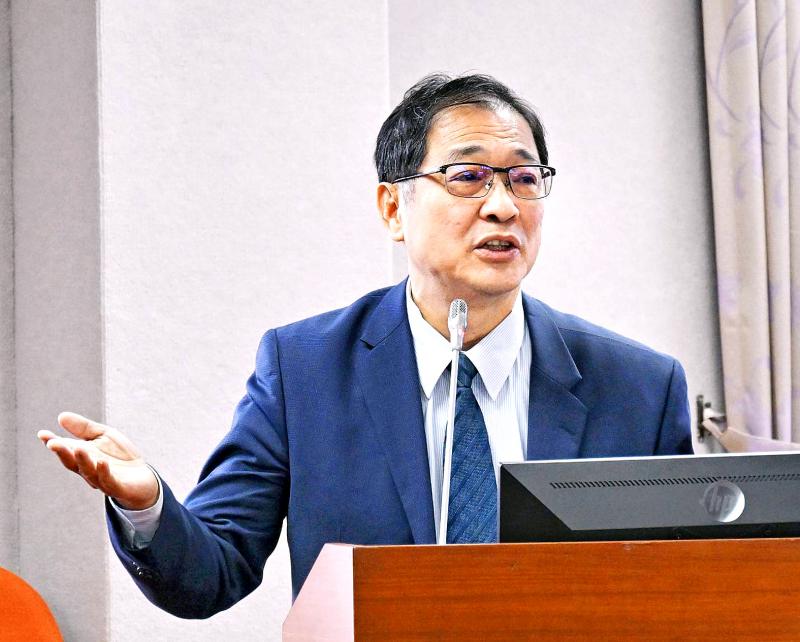The right to re-establish a special investigative division (SID) belongs to the judiciary, Minister of Justice Cheng Ming-chien (鄭銘謙) said yesterday, after Chinese Nationalist Party (KMT) caucus whip Fu Kun-chi proposed setting up an “opposition party SID” to investigate government officials.
Prosecutors’ offices already exercise the powers of investigation and prosecution, Cheng said when asked by Democratic Progressive Party (DPP) Legislator Rosalia Wu (吳思瑤) whether such a division is necessary or constitutional during a meeting of the legislature’s Judiciary and Organic Laws and Statutes Committee.
The SID was established under the Supreme Prosecutors’ Office in 2007 and abolished in 2017.

Photo: Chen Tsai-ling, Taipei Times
It was granted special powers to investigate corruption and financial misconduct by the president, vice president, the heads of the five branches of government, ministerial-level officials and generals.
The division’s wiretapping and other controversies led to political turmoil in 2013 involving then-president Ma Ying-jeou (馬英九), then-legislative speaker Wang Jin-pyng (王金平) and other prominent figures.
Lawmakers amended the Court Organization Act (法院組織法) to abolish the SID on Jan. 1, 2017.
The Ministry of Justice listed five major reasons to terminate the SID, including that its functions can be performed by existing prosecutors’ offices, Wu said.
“We therefore must not revive this agency, as it would interfere in the proper functioning of the legislature and other government branches,” she said.
Fu told reporters the party would not set up an SID with state funding, nor let the judiciary be in charge.
“It is up to opposition parties to take in ideas from all sides and join together to investigate all the major scandals over the past eight years,” Fu said.
Taiwan People’s Party Chairman Ko Wen-je (柯文哲) on Wednesday said that his party does not support the idea.
“Since campaigning last year, our party had opposed the SID. The nation’s laws must have consistency, fairness and equal application, so we should not have another special unit to investigate top government officials,” Ko said.
DPP Legislator Michelle Lin (林楚茵) said the push to revive the SID is Fu’s way of avenging what he perceives as unfair targeting by the justice system on his cases of financial misconduct and other crimes in past two decades.
Fu went to prison twice in 2018 and 2020 for insider trading, stock manipulation and document forgery for a fraudulent divorce from his wife to enable her to serve as Hualien County commissioner after Fu was convicted and had to serve time in prison.
DPP Legislator Chen Kuan-ting (陳冠廷) said re-establishing the SID would seriously harm judicial independence.
“For the SID to be revived under KMT control, it would be under the party’s political manipulation, and impossible to act with objectivity, fairness and equality toward all citizens,” Chen said.
“Legislators must not abuse their power to interfere in the proper functioning of the justice system,” he said.

CHANGING LANDSCAPE: Many of the part-time programs for educators were no longer needed, as many teachers obtain a graduate degree before joining the workforce, experts said Taiwanese universities this year canceled 86 programs, Ministry of Education data showed, with educators attributing the closures to the nation’s low birthrate as well as shifting trends. Fifty-three of the shuttered programs were part-time postgraduate degree programs, about 62 percent of the total, the most in the past five years, the data showed. National Taiwan Normal University (NTNU) discontinued the most part-time master’s programs, at 16: chemistry, life science, earth science, physics, fine arts, music, special education, health promotion and health education, educational psychology and counseling, education, design, Chinese as a second language, library and information sciences, mechatronics engineering, history, physical education

The Chinese military has boosted its capability to fight at a high tempo using the element of surprise and new technology, the Ministry of National Defense said in the Quadrennial Defense Review (QDR) published on Monday last week. The ministry highlighted Chinese People’s Liberation Army (PLA) developments showing significant changes in Beijing’s strategy for war on Taiwan. The PLA has made significant headway in building capabilities for all-weather, multi-domain intelligence, surveillance, operational control and a joint air-sea blockade against Taiwan’s lines of communication, it said. The PLA has also improved its capabilities in direct amphibious assault operations aimed at seizing strategically important beaches,

‘MALIGN PURPOSE’: Governments around the world conduct espionage operations, but China’s is different, as its ultimate goal is annexation, a think tank head said Taiwan is facing a growing existential threat from its own people spying for China, experts said, as the government seeks to toughen measures to stop Beijing’s infiltration efforts and deter Taiwanese turncoats. While Beijing and Taipei have been spying on each other for years, experts said that espionage posed a bigger threat to Taiwan due to the risk of a Chinese attack. Taiwan’s intelligence agency said China used “diverse channels and tactics” to infiltrate the nation’s military, government agencies and pro-China organizations. The main targets were retired and active members of the military, persuaded by money, blackmail or pro-China ideology to steal

The High Prosecutors’ Office yesterday withdrew an appeal against the acquittal of a former bank manager 22 years after his death, marking Taiwan’s first instance of prosecutors rendering posthumous justice to a wrongfully convicted defendant. Chu Ching-en (諸慶恩) — formerly a manager at the Taipei branch of BNP Paribas — was in 1999 accused by Weng Mao-chung (翁茂鍾), then-president of Chia Her Industrial Co, of forging a request for a fixed deposit of US$10 million by I-Hwa Industrial Co, a subsidiary of Chia Her, which was used as collateral. Chu was ruled not guilty in the first trial, but was found guilty